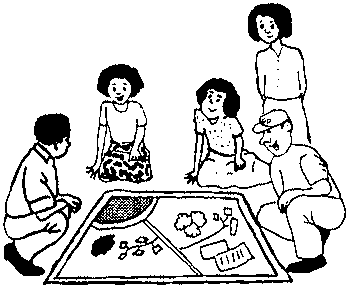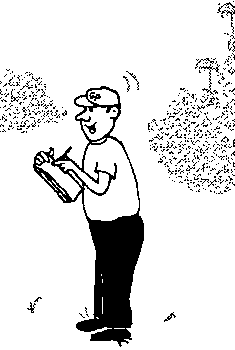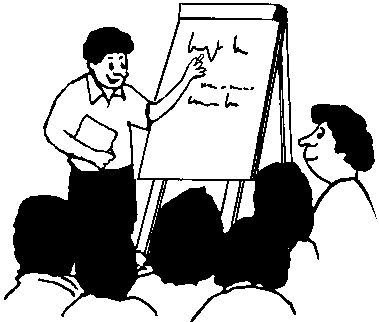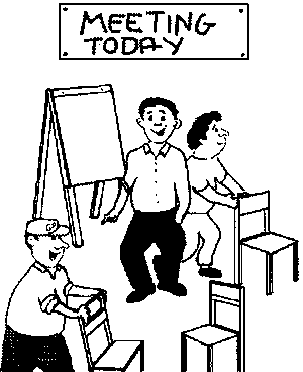Chapter 1: The role of a group promoter
Chapter 2: Working methods of a group promoter
Chapter 3: Using participatory learning methods

As a group promoter (or GP), you are a key agent in rural development and in the development of your country. Your task is to help the rural poor to build their capacity to organize and manage their own activities.
Whereas extension agents, community development workers and project field staff normally deal with entire rural communities, group promoters assist exclusively the poor. GPs do not treat the rural poor as passive recipients of assistance. You must work side by side with the poor, building up their confidence in their own abilities and promoting their self-reliance.
Essentially, your job is to serve as a facilitator, with three basic roles:
· Group adviserProfile of a GPYou strengthen the rural poor’s leadership, organizational and planning capacities.
· Participatory trainer
You teach group members basic technical, literacy and problem-solving skills.
· “Link person”
You facilitate communication between the groups and government and NGO development services, such as banks, the extension service and input supply agencies.
Group promoters come from a variety of backgrounds. In countries where there is a lack of well-qualified personnel willing to work in isolated villages, GPs are recruited from among young men and women with a secondary education.
In other countries, group promoters are university graduates. Many GPs are drawn from extension services or similar government agencies or from development NGOs already working in rural areas.
Qualities of a group promoter
To be effective, you must have some experience in working with people and local organizations in rural areas. You should be familiar with the problems of the rural poor and have a strong commitment to live with, work with and assist them for at least two years. You should also be familiar with the language and culture of the target action area in which you will work.

It will help if you have a rural background, at least secondary-level education, and experience in community or rural development or in such fields as social work, elementary economics or sociology, agriculture and extension.
|
Your “clients” One group promoter can organize about 15 groups in three
years. Thus, each GP should reach directly in three years some 150 households,
or at least 900 people, including group members and their dependants. |
|
Advantages of the small group approach
Economies-of-scale. Providing development services to individual small-scale farmers is too expensive for most governments. Small self-help groups overcome this problem because they represent many farmers, not just one. When they deal with a group, development services are more efficient and have greater impact. For example: an extension agent can train many farmers at a single meeting; a bank can provide one big loan for the season instead of many small ones; the group can take over responsibility for distributing fertilizer and seed. More production and income. Given better access to credit, inputs and information, the poor can achieve higher levels of production and income. Increased income creates savings, which can then be used to expand production even further and to meet other needs. Acquisition of new skills. In a small group, the poor learn very quickly how work together, analyse problems together and plan together. These are important skills that can be used in the development, at a later time, of inter-group federations and national-level organizations. Sustainability. Small groups help the poor become more
self-reliant and can be linked up into a network of self-sustaining rural
organizations. This carries important benefits - the increased efficiency of
development services stimulates economic growth in rural areas and overall
national development; politically, participation allows the poor to contribute
constructively to development. |
GP training aims at introducing you to participatory approaches and procedures and fostering motivation and team spirit. You will need, in particular, management training in production planning and implementation, transfer of appropriate technology, marketing, communication techniques, leadership, team-building, record-keeping and writing of reports.
An inception training workshop of at least three weeks should be given in or near the target area for all GPs, along with other project staff and key officials of the delivery system. The curriculum should be pragmatic and include work experience presentations by participants.
After this inception training, you will need initial field training of two to three months. This period coincides with the start of your field activities in the action area. You should learn to prepare and carry out village and household surveys, to solve problems met in the field and to cooperate with other development and service agencies.
Follow-up training of GPs should be carried out at monthly meetings to evaluate team performance, to identify and solve problems in your work and to prepare field workshops and refresher courses. You might also collaborate in issuing a project newsletter and take part in exchange visits to other participatory projects.
Posting group promoters in rural areas
GPs are expected to live in - or very close to - the villages in which they work. Once villages have been identified, at least two group promoters should be assigned to each cluster and begin work in a core village (in many cases, male-female teams may be more effective).
As a GP, you should be always available to the members of the groups. Your image among the population in your action area is important. You should gradually build up confidential relationships with the local community, including the poor, the big farmers, local government officials and community leaders.
Through daily interaction with the poor, you will gradually come to be regarded as a friend and guide, and not as an official or outsider who interferes with the local culture and habits.
Withdrawal of the group promoter
As a group promoter, your main objective is help the rural poor to improve their living conditions and become self-reliant. You promote self-reliance by involving the group members in activities that allow them to develop leadership and technical skills.
You should encourage group-to-group exchanges, and ensure that one or more group members is present whenever you deal with development services or government officers.
When and how should you begin to gradually withdraw from your groups? The disengagement process is a delicate one and depends on the rate at which each group develops. Experience indicates that it takes from three to five years for groups to achieve complete self-reliance. Once a group is capable of gaining access to government and NGO services and taking other initiatives without your assistance, you can gradually withdraw to concentrate on serving other more needy groups. You may need to make only occasional return visits to ensure that progress continues.
Setting up inter-group federations is important, as these bodies can gradually assume many of your responsibilities. Self-reliance may not always mean total disengagement: in some cases, the inter-group associations may hire you to perform certain specific functions.

Group promoters are involved in many activities to help their groups. We will look here at these activities and see how you can organize yourself to perform them effectively.
As a group promoter you have three main tasks:
· To help the rural poor form sustainable self-help groupsRemember: you are a facilitator
· To help the groups undertake a profitable, financially sustainable activities
· To guide them in participatory monitoring and evaluation (PMOE) of their progress.
As a GP, you must never forget that your task is to help group members become self-reliant, i.e. able to manage their affairs on their own. Your role changes over time - from initiating and leading to guiding and assisting, and finally to advising.
Initiating and leading, however, does not mean teaching - and even less dictating. You will be working with adults who have a lot of knowledge and expertise in their fields. It is your task to help them realize the hidden potential of their knowledge and expertise and develop the confidence to decide and do things on their own.
|
Ideal behaviour in group promoting Listen before you speak - Be respectful - Be patient - Never
promise anything before you are sure you can keep it - Always keep your
promises |
People will probably not be accustomed to this participatory approach. They may think their role is to listen, rather than speak. Help them by asking their views, listening to them and encouraging their active involvement. Ask them questions, don’t simply give them answers. They will gradually come to appreciate your style and approach.
The groups will need your services less and less as they progress, until eventually you will need to visit them only at their request or to check on progress. Withdrawing is not easy, but it means that you have done your work well - and that is something to be proud of!
Direct assistance to self-help groups
To assist groups properly you have to:
· Attend group meetingsWhat to do during group meetings
· Visit the groups when they carry out their group activities
· Visit with and talk to individual members and other people from the community
· Organize workshops, training sessions and evaluations for group members
· Follow up on items discussed in the meetings, workshops, training sessions and evaluations.

At the end of any meeting with a group, it is essential that the members feel that they have not wasted their time and that you have listened carefully to their opinions. To help members get the most from their meetings, you should help the group leaders:
· To structure the meeting by setting beforehand an agenda with topics and prioritiesWhat to do when visiting a group income-generating activity· To allow flexibility so that the agenda can be changed if other topics arise during the meeting
· To report about the previous meeting and any other important group events
· To encourage members to participate in discussions - do not allow one or a few members to dominate the others
· To use participatory learning methods to provoke discussions
· To encourage decision making - but do not push for decisions
You can take the following actions to find out if and where the group needs assistance:
· Discuss problems and try to help the members solve them· Monitor member attendance and activities during work time
· Monitor the work plan, production plan and the follow-up of items discussed in meetings, workshops and evaluations.
· Check that decisions they are being followed - offer assistance if necessary
· Check group records, and make sure they are complete and up-to-date
|
Planning a training course or workshop In planning a training course or workshop, you should first define who the session/workshop is meant for - group members, assisting staff or others. Then decide why a session/workshop is necessary - what is the need? After choosing a relevant topic and set specific objectives, decide when and where the training should take place (remember that women may not always be able to attend meetings). Consider also what items should be discussed, what training methods and techniques should be used and who will act as resource persons. At this point, you should make a work plan to make sure the workshop/session runs smoothly. The work plan should include: · Materials needed for the session - e.g. books and postersYou should also decide who should write a report - every workshop or training should be recorded to remind the group of what was done and the reactions of the participants. The report should cover: · The topic and why it was chosen (i.e. need and objectives)
|
Organize workshops or training sessions to improve the members’ understanding of specific items or to improve certain skills. A training session can also be part of a regular meeting.
Training topics for group members should include:
· General participatory techniques
These include techniques that enhance member participation in decision making. Subjects include group dynamics, leadership, planning of group activities, savings and credit, accounting, enterprise management, monitoring and evaluation, and negotiating and bargaining. Training might also centre on eliminating social problems, such as alcoholism and gambling.· Specialized training
Specialized training is tailored to the groups’ specific needs. It includes training in crop production, small livestock development, soil and water conservation, small-scale aquaculture, forestry and group marketing, and non-farm activities such as crop processing, weaving, tailoring, pottery, and production of house-building materials or handicrafts.· Training in home and community development
Subjects include health, sanitation, first-aid, nutrition and child care, as well as management, leadership and village development.· Other topics
Other recommended training topics include legal matters (such as tenancy rights), mortgaging, wages, and banking and administrative procedures. Useful information on these topics is frequently not communicated to the poor. Group literacy classes for adult women and men help them to analyse their problems and plan actions, and reduce their dependency upon literate villagers or group members.

Not all rural people feel comfortable in groups. Some people are shy and do not speak up easily. Other people dominate discussions or do not listen. Many find it difficult to make the compromises needed to reach an agreement. In order to involve ail the members in group activities, you will need to know and use participatory learning methods.
Participatory learning
Participatory learning is a creative problem-solving method, in which every member participates actively. The approach involves specific attitudes, skills and knowledge. In the participatory approach, the learning process is just as important as the subject being learned.
The groups you will form are ideal laboratories for participatory learning, since they are small enough to allow every member to participate.
Characteristics of participatory learning
· Originates from the needs and problems of group membersBenefits of participatory learning
· Uses each group member’s knowledge, experience and skills
· Considers every participant a trainee and a trainer
· Uses practical real life activities so participants learn by doing
· Takes place at a location and in a setting where participants feel at ease.
· Gives group members better insight and understanding of their situationThe role of the GP in participatory learning
· Makes them more aware of their own values, attitudes, skills and knowledge
· Allows them to discover their hidden talents and capacities
· Gives them experiences in problem solving and decision making
· Above all, increases their self-confidence and self-esteem.
As group promoter, you are both a facilitator and a participant. As a participant, you contribute your knowledge, ideas and experiences. You also learn from the rural people. As facilitator:
· You guide the discussions - you introduce the session, structure the discussion and summarize regularly· You ask, probe and listen: “What do you mean”, “why do you think so?”
· You acknowledge the people’s views and opinions
· You give participants time to express opinions and ask others to listen
· You stimulate creative ideas
· You encourage everybody to contribute
· You look for practical methods promote people’s involvement
· You consider carefully how participants react to each other.
|
Make room for the women!
You need to pay special attention to women’s participation in discussions and activities. You can increase their involvement by encouraging them and discouraging men who dominate discussions. Use the special techniques outlined below and in Annex 1. You
can also encourage members to form separate men and women’s discussion or
working groups. |
There are many techniques to promote participatory learning. They are briefly described in Annex 1, beginning on page ???. Study them carefully, test them with your supervisor and other GPs, and apply them in your work. The techniques can be used in meetings, workshops, evaluation and during visits.
Preparation
Facilitating participatory learning requires careful preparation and flexible handling of group meetings and training sessions. You should plan the following:
· Choose a topic for the session related to a perceived need or problem among group members. Write a clear objective for your sessionDuring the session· If you think it is necessary, you may use a warm-up technique to make members feel at ease (see below)
· Prepare a list of step-by-step guide questions and possible answers
· Choose from Annex 1 techniques which fit the topic and objective of the session. Consider the level of understanding and experiences of the participants, the time available and techniques used in other sessions
· Arrange the meeting place in such a way that people will feel at ease to participate and that everybody can see each other;
· Explain the choice of the topic and ask the participants some of their experiences. Their reactions will give you a better understanding of the way they feel about the topic and related issues. Other issues may be revealed. If it is important to consider the new issue, do so.After the session· Follow the step-by-step-questions you prepared or use them together with the participatory technique chosen. However, be flexible, the questions should be used as a guide only and not a rigid session of question and answers.
At the end of the training session or a workshop, you need to know how the people, men and women, feel about it and if the group has achieved its objectives. It is important that the participants think about what has happened and what they have learned or gained.
Several factors influence the success or failure of a workshop:
· The topic: Was it relevant and clear?· Members’ participation: Was it active?
· Presentation of resource persons: Was there a good, clear explanation of subject, appropriate methods?
· The chairperson: Did he/she provide a good introduction and final summary?
· The programme: Was it well-timed, with a relevant agenda?
· Attendance: Did women as well as men attend?
· Organization: were the locality suitable? Was the date and time convenient for participants? Were the materials adequate?
|
Ask simple questions By asking simple questions, a GP can stimulate discussion among group members and give them experience in problem solving and decision making. For example, in a discussion about the writing of a group constitution, the GP asked the following questions: Question: What is a group constitution? Answer: A set of agreed rules that says how our group will work together. Q. Why does your group need a constitution? A. To guide and to discipline members. Q. Who is the constitution meant for? A. For ourselves. Q. Who should write the constitution? A. We should write it ourselves. Q. How can a constitution be made? A. Through discussion about our needs and problems, and by meeting and working together. Q. When should the constitution be made? A. We will make some simple rules as soon as possible; later we will add more. Q. Where should the constitution be kept? A. In our record book - with a copy for the
Chief... |